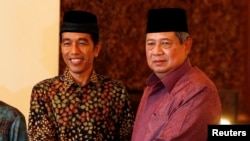Outgoing Indonesian President Susilo Bambang Yudhoyono has returned home early from an official trip overseas after sparking protests and anger over his handling of a bill that will end direct elections for local and regional officials.
After returning from Japan Tuesday, the president held an emergency meeting with his Cabinet and reaffirmed his government's support for direct elections.
"The government’s position on the [elections of governors, regency heads and mayors] is that it should be done directly by the people, but with certain basic improvements. On the basis of that and based on existing objective conditions, and the need for a system or appropriate laws in line with the people’s aspirations, the government is consistent, that the best way is to have direct elections but with basic improvements," said Yudhoyono.
The president said he has consulted with the nation's Constitutional Court on what action he can take, but added he is bound to follow the new law, which parliament passed last week.
Many have questioned his honesty on the matter, given that he could have stopped the bill before it was deliberated by parliament. It was also his party that walked out of the legislature in order to abstain from the final vote, allowing the measure to pass.
According to constitutional law expert Refly Harun, the law is valid and its implementation is mandatory; but, he says he has advised the president of a legal way to nullify the measure.
“There are two things the president could do, all of which lead to a [presidential decree in lieu of the law]. The first step is, the president must state that he does not agree with the [new] law, and therefore he needs not give his approval. Then he can ignore the law and issue a [decree] to fill in the legal vacuum. Or, secondly, the president can sign the bill into law and soon afterward revoke [the law] and issue a [decree]," said Harun.
The new law will allow regional parliaments to select local officials, a system that was in place during the longtime rule of former dictator Suharto.
Local officials have been chosen by a direct election since 2005, a move credited by many observers with helping Indonesia improve its democracy.
This report was produced in collaboration with the VOA Indonesian service.




